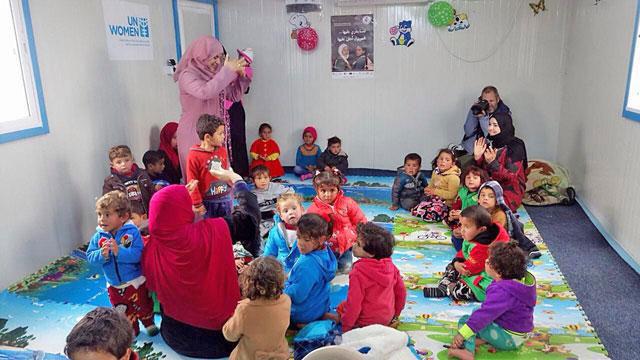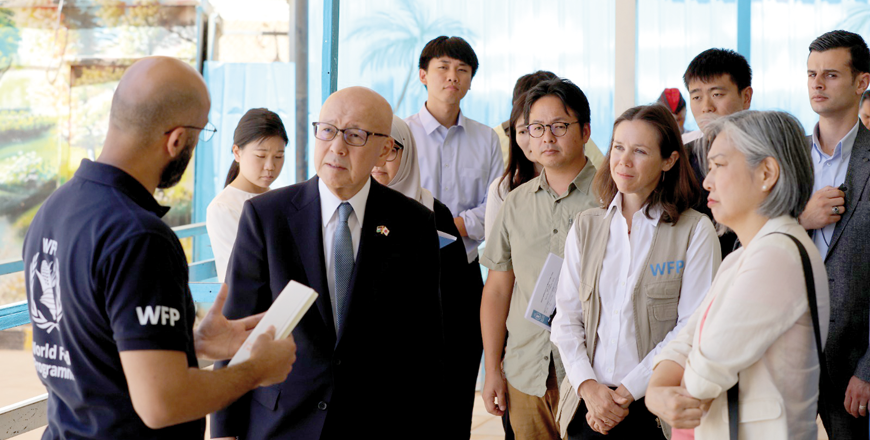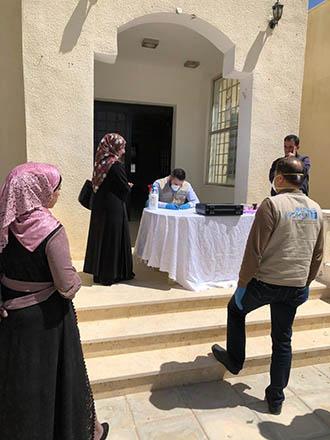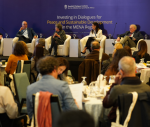You are here
UN Women and WFP implement blockchain at Zaatari and Azraq camps
By JT - Sep 19,2018 - Last updated at Sep 20,2018

Refugee women, children at the Azraq camp, UN Women and the World Food Programme announced on Tuesday they will implement blockchain for the cash for work programmes in Zaatari and Azraq camp (File photo)
AMMAN — UN Women and the World Food Programme (WFP) announced on Tuesday through a statement that they will start implementing blockchain for the UN Women’s cash for work programmes in Zaatari and Azraq refugee camps.
According to the statement, women will scan their eyes to request cash back at WFP-contracted supermarkets. This will link to their accounts on the blockchain, and the amount of the cash distributions is automatically sent to “Building Blocks”.
This should result in improved security and accountability the statement said. There are also opportunities for cost and risk reduction, as well as increased harmonisation of aid efforts.
According to the release, cash transfers have traditionally been made available to refugees through third-party financial service providers such as banks. However, through the partnership, women who participate in the UN Women cash for work programme will be able to access their funds directly and the accounts will be kept securely on a blockchain network.
The partnership stems from WFP’s Building Blocks project, which already provides cash transfers to 106,000 Syrian refugees in Jordan through a blockchain based system.
“At WFP, we will explore every possible way to deliver the help people need, in the most efficient and effective means available.” said David Beasley in the statement, executive director of WFP.
UN Women also aspires to increase the financial literacy of their recipients through expense tracking and budgeting seminars conducted at their “Oases”, where recipients would also be able to view their Building Blocks accounts and its history online the statement said.
“We know that women in crisis situations and displacement settings tend to have lower digital literacy than men, and often lack access to the technology and connectivity that are so critical in today’s world,” UN Women Executive Director Phumzile Mlambo-Ngcuka said, adding “UN Women is partnering with WFP to change this by using innovative technology to drive change for women in the most challenging settings and to accelerate progress towards women’s economic empowerment on a large scale.”
According to humanitarian organisations; women are disproportionately affected by humanitarian crises, many of them are forced by conflict to become the primary bread winners, while bearing the responsibility of taking care of their children and families.
“Our work with UN Women to help female Syrian refugees is yet another sign of that innovative spirit, in this case using technology to make an even bigger impact on the lives of those we serve,” Beasley said in the statement.
Related Articles
AMMAN — The United Nations World Food Programme (WFP) today accompanied Okuyama Jiro, the ambassador of Japan to Jordan, during a visit to t
AMMAN — The United Nations World Food Programme (WFP) received a timely and generous contribution of $16.8 million from Saudi Arabia’s King
AMMAN — The Government of Australia, through the Department of Foreign Affairs and Trade, has extended an additional contribution to UN Wome

















